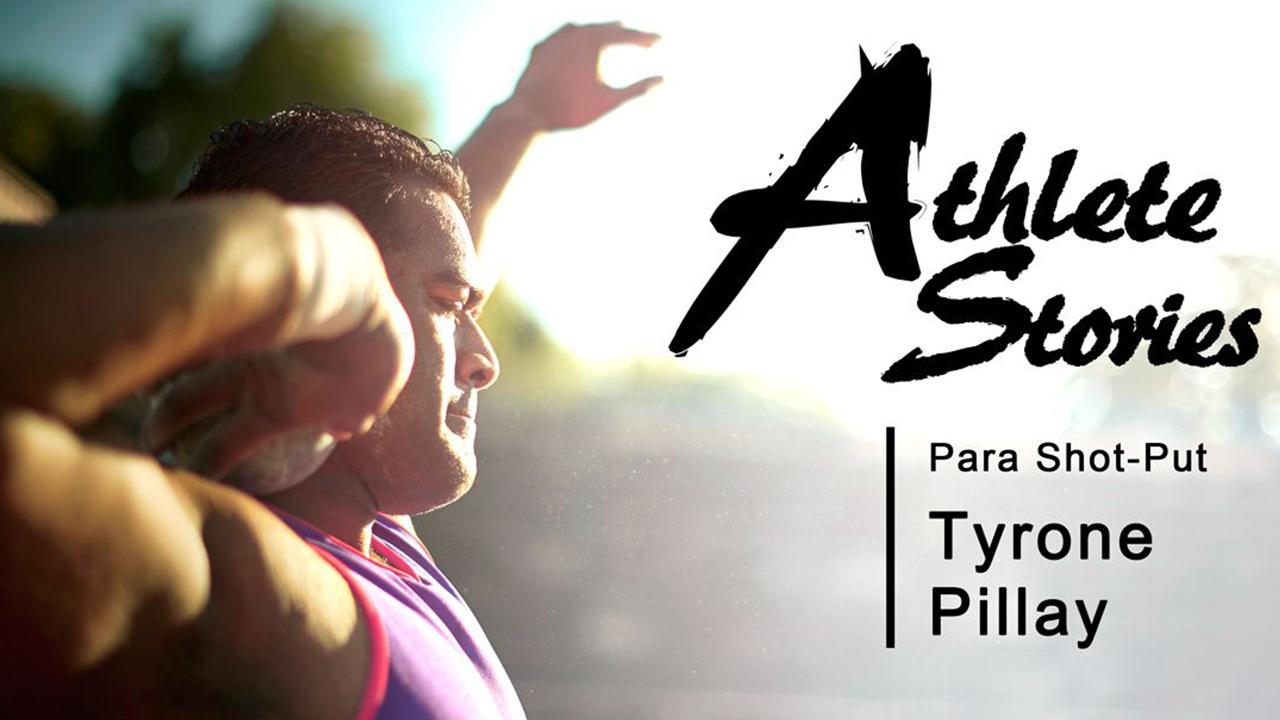
Tyrone Pillay is a 13-year Toyota employee at Toyota South Africa Motors. He is also an avid cricket fan, children's mentor, Para athlete, and Bronze medal Paralympian from the Rio de Janeiro 2016 Paralympic Games in Shot-Put. The following is based on a conversation we had with him in September 2018.

※The article has been published in Toyota Global Newsroom on November 16, 2018.
Tyrone Pillay is a 13-year Toyota employee at Toyota South Africa Motors. He is also an avid cricket fan, children’s mentor, Para athlete, and Bronze medal Paralympian from the Rio de Janeiro 2016 Paralympic Games in Shot-Put. The following is based on a conversation we had with him in September 2018.
Sitting in front of us in Tokyo, the tall, well-built and muscular Tyrone Pillay is a force – he seems invulnerable and ready to conquer the world. Shot-Put Bronze Medalist of the Rio de Janeiro 2016 Paralympic Games, Tyrone had dreamed of being a South African athlete since he was three years old. This is a brief story of how he got there.
FAMILY GROWING TOGETHER
“When I was born,” starts Tyrone, “the doctor immediately took me away. That’s how my mother realized there was something wrong with her newborn baby. Later that day, she learnt that her baby boy was born with something wrong in his left leg.”
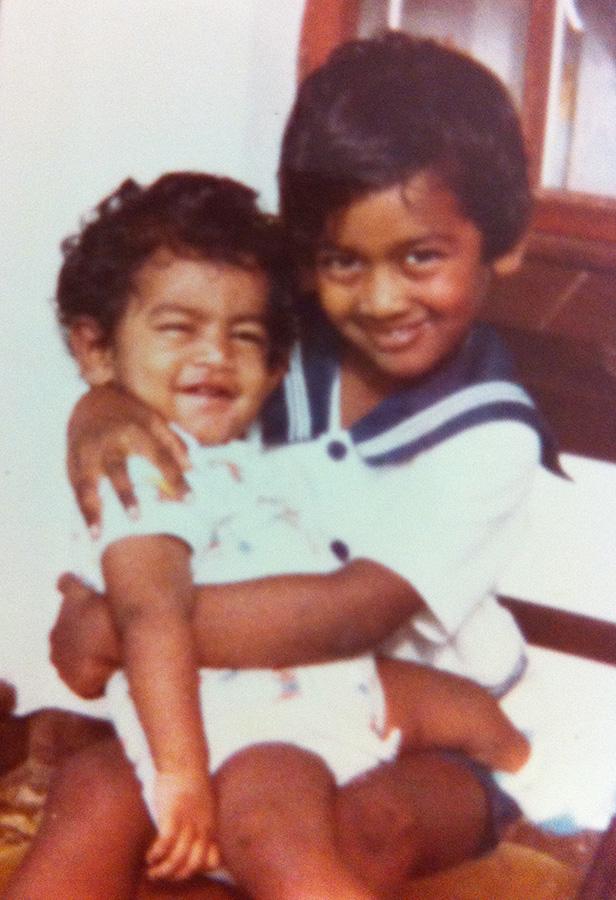
As we chat, he recalls his childhood, and how his family grew stronger together over time.
His family treated him as a kid with no impairment, meaning he didn’t get any special attention, and he lived his life as most able-bodied kids do. When he was a child, his brother would tackle and take him down when they played soccer, just as if he was playing with other kids. “I started using prosthetic legs when I was 10 months old, and, my family always treated me like a normal child, even my older brother would play rough with me,” he recalls.
One day when he was six, his prosthetic leg broke. He looked at his dad hoping he would help him up and fix it. “Can you help me up?” Unexpectedly, his father’s answer was “No.” To this day, he still remembers his father’s next words, which were: “One day I’m not going to be at your side, you need to pick yourself up.” So Tyrone picked himself up, and, with one leg, hopped around all the way home and later fixed the prosthetic leg on his own.
This may sound like a tough way of raising children, but being taught and treated the same as other boys by his father also brought his family together. Tyrone was brought up to be independent and not feeling any different from his surroundings. The first “inclusive society” for him was his family itself.
Of course, he also recalls the challenging days when he questioned why he was born this way. Growing up with impairment was hard. Often bullied and mocked as a young boy, he remembered feeling embarrassed of his prosthetic leg.
Through this challenging period, his grandmother kept telling him that people would grow and “they will see who you really are.” Tyrone took his grandmother’s advice to heart, but it took him a long time to find who he was – until around 2009, when Tyrone started to view his prosthetic leg as gift. Today, he believes that embracing his impairment has given him a second chance at life. Everything he regretted in the past is what he feels the most grateful about now.
“Looking back now, my family had developed, and I had developed, and my condition made my family stronger the way it had made me stronger,” Tyrone smiles gratefully.
As he talks about them, it is clear that his family members, especially his parents, are his role models and the reason Tyrone is the man he is now.
LEARNING THE HARD LESSONS OF LIFE THROUGH CRICKET
Well-known for his huge powerful figure, it is hard to imagine that he was not this big when he was young. In his youth, he played cricket for over 14 years, in a league of able-bodied athletes. “I was actually really good, and I remember it made me a little bit arrogant that time,” he readily admits. Moreover, his father was the manager of the team he was in. At that time he felt overly confident that he would always take an important part in every game. However, one day, his father told him to sit out the team selection, and that he wasn’t going to be the main player. Tyrone was furious. “Why?” he recalled asking his father, “I am the best player and I am being told to sit out?!?”
His father’s answer was a surprise. He told Tyrone, “Until you learn that you are part of the team, you’ll never play again!” He then made Tyrone sit on the bench for five games, only to put Tyrone as water boy for the next six games. At that point, Tyrone started to learn what his father wanted him to learn, which was to understand the role of each player, and the dynamic of teamwork. Even after he learned this first important lesson, his father didn’t stop there; he made him sit on the bench for the following ten games. But somehow, Tyrone’s attitude turned positive. It made him value every single moment in his life and to not to take things for granted.
Tyrone stopped playing cricket when he realized it would be hard to make the South African Cricket team due to his impairment. But this didn’t stop his passion for sports. He watched the Beijing 2008 Paralympic Games and it rang a bell, inspiring him to take another path to his dream.
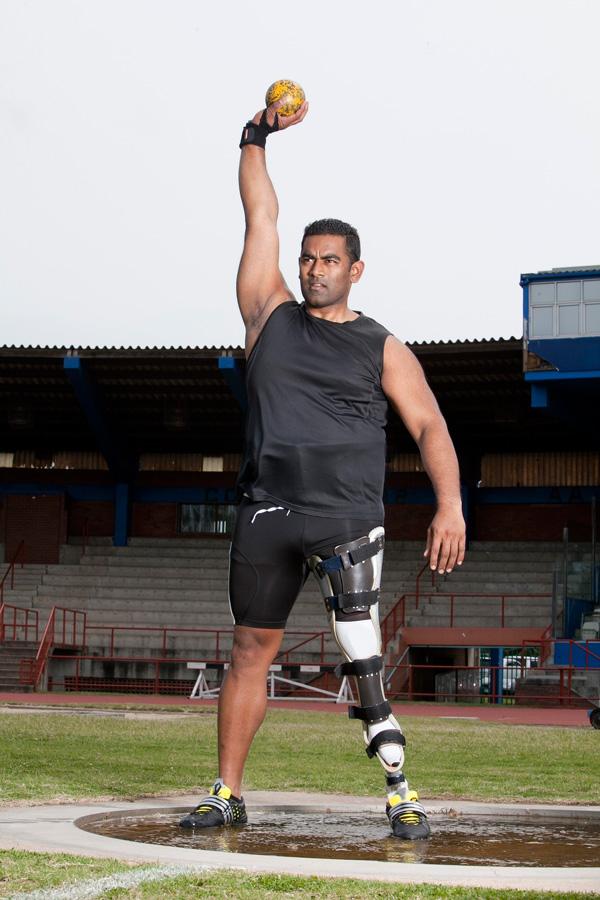
Jokingly, Tyrone tells us how he chose Shot-Put as his sport: “I was too fat to run fast enough for a medal, so I’d rather use my strength for something else. Probably throwing things,” he said as he put on a cheeky smile. He had always been interested in the world’s strongest figures, and though running looked like fun, doing something with strength would be more his cup of tea. At first, he tried doing the javelin and discus throw. But it wasn’t until he tried Shot-Put that he saw where his talents would be best used.
Once set on Shot-Put, he had to change his know-how from his previous sports and learn a new one. He aimed for the London 2012 and Rio de Janeiro 2016 Paralympic Games. Although he didn’t make it to the team for London 2012 Games, he was finally able to reach his dream to become a Paralympian in Rio de Janeiro 2016 Paralympic Games. In his first Paralympic Game, Tyrone Pillay brought home a Bronze medal for his country and this exceeded his expectations, as it became only the seventh ever Paralympic medal earned for South Africa.
LEARNING ON YOUTUBE
Although he trained very hard, Tyrone had never really trained with a coach before. In fact, he tried learning himself first. He started by watching Shot-Put tutorial videos on YouTube. His first formal training with a coach from Denmark that he met online and exchanged messages with didn’t come until a couple weeks before the Rio de Janeiro 2016 Paralympic Games. With just 10 days before the Games, Tyrone had to let go of all the techniques he had learned on his own and used until that point, and learn new ones with his coach. But the hard work paid off when he stood on the platform to receive the Bronze medal.
AS AN ATHLETE, TREATED LIKE EVERYONE ELSE
Sport is more than a passion for Tyrone -- it taught him the values he practices in everyday life. Through sport he learned to respect people, discipline, team work, and the importance of leadership.
The Paralympics also bear a profound life-changing meaning for Tyrone. To him, the Paralympics made him feel accepted. Tyrone felt he wasn’t really fully accepted in an able-body world because of his impairment. But in the Paralympics, he was seen as an athlete, and found that he was treated as an individual, equal to everyone else.
“People seem to be giving more attention to the Paralympics nowadays. However, more efforts are still necessary to promote Paralympics in society,” he goes on. “To support the Paralympic Movement, it is important to educate everyone about people with impairment. One of the ways is by showcasing the Paralympics, exposing the games to more people to provide greater understanding. Tyron also says it is important to share the knowledge with the next generation. Tyrone proudly shows his prosthetic leg to us, and he talks about how he doesn’t mind taking time to explain to passersby or strangers he meets, such as a group of school-age kids he just met on a Tokyo train, just to provide them better understanding toward impairments. He believes small steps can change society’s perspective. “You too, can support the Para Movement by educating [people in] your surroundings,” he said.
Rio de Janeiro 2016 was undeniably an important milestone in Tyrone’s life as an athlete. This moment adds to the strong memory he has of when he officially became a South African athlete, finally achieving the impossible dream he had harbored since he was three.
However, he insists that Rio 2016 was not special because of the medal. To Tyrone, winning a medal has never been his focus. His target was and still is to become an athlete and do his best to represent his country; the medal and everything that came with it was something that would eventually come to him as bonus for his hard work.
Tyrone says his joy would have been complete if his father, Teddy, could have seen him on the podium. The man who was his coach in sports and in life passed away when Tyrone was 22; he never got to see Tyrone reach his goals of representing South Africa or winning his first medal as his son made his way as a Paralympian.HELPING OTHERS OVERCOMING OBSTACLES
“The Hulk” is Tyrone Pillay’s nickname. Judging by his huge appearance, the name suits him. But he’s also known as the “Gentle Giant” for the right reason. Although he grew up with the hardship of being different, he didn’t become a hardened, negative person; instead, he chose to share his experiences and dreams with kids in similar conditions.
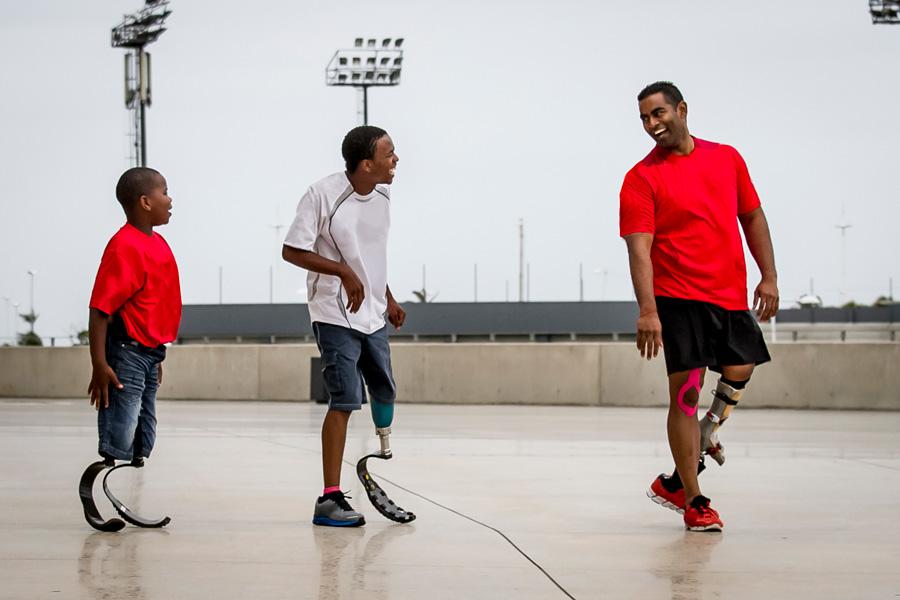
Since 2009, Tyrone has been involved as an ambassador for “Jumping Kids”, a non-profit organization that provides prosthetics for South African children living with lower extremity amputations. He hosted the StepUp500 Challenge fundraiser in 2013 and a second StepUp500 event in November 2014 to further assist children living with amputations. Knowing what these kids have to go through in their life based on his experience, Tyrone also actively acts as a mentor to kids and youth with amputations at Open Air School. He has been supporting around 200 kids since 2011.
TYRONE AND TOYOTA
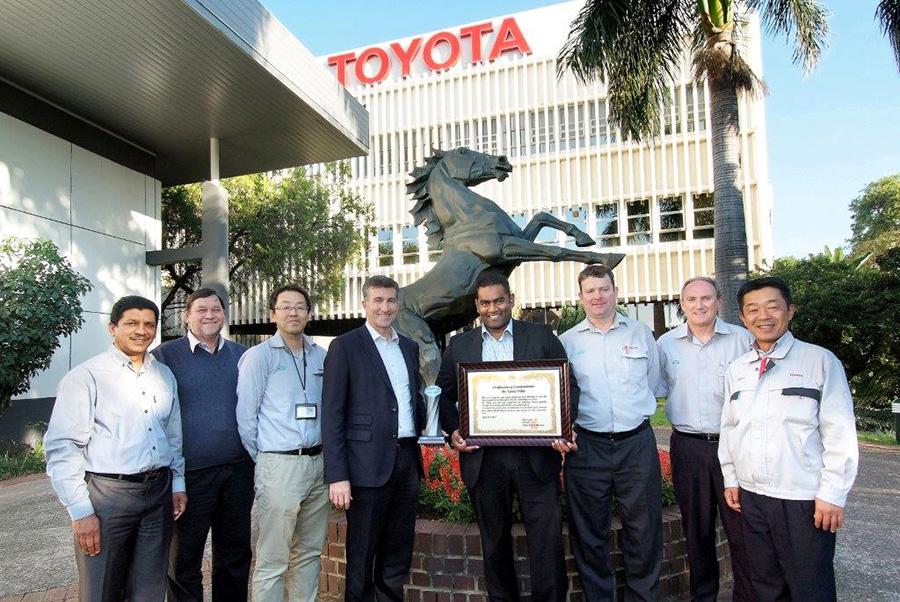
Tyrone joined Toyota South Africa Motors (TSAM) on July 2005 and has been part of the IT Department since then. Tyrone believes he and Toyota share similar values, saying, “I share Toyota’s value of respect for people that is demonstrated across Toyota,” he said. “Meeting Akio Toyoda is what stood out the most, how he portrays a certain image of the company, which is aligned with something I want to do and how I’d like to live.” Tyrone found Toyota as great place to work, and where he can learn more values.
During his preparation for Rio Paralympic Games, Tyrone was balancing his daily eight hours of work with his training – something that wasn’t easy. His hard work is has paid off though; he is now receiving immense support from his Toyota colleagues around the world on his journey to Tokyo 2020. “It was massive,” he says as he recalls how he was touched by the growing support from team members when he visited Toyota in Japan last month.
MOBILITY BROUGHT TYRONE TO HIS DREAM
Tyrone Pillay was more than excited when Toyota announced its transformation to Mobility Company, because mobility has been an important part of his life.
Speaking about mobility with Tyrone, you suddenly realize how important it is. When people think about mobility, they think about moving from one place to another. To Tyrone, mobility means freedom, choice, and opportunity. “Mobility allowed me to get education, to go to school, to go to work, to play sports, to be the person I am today,” he said.
Tyrone is proud to support Toyota’s mission in providing “Mobility for All”, knowing how important it is to everyone without exception. He personally likes the whole idea of “Start Your Impossible”. For him it means “you can go out and do anything you want”.
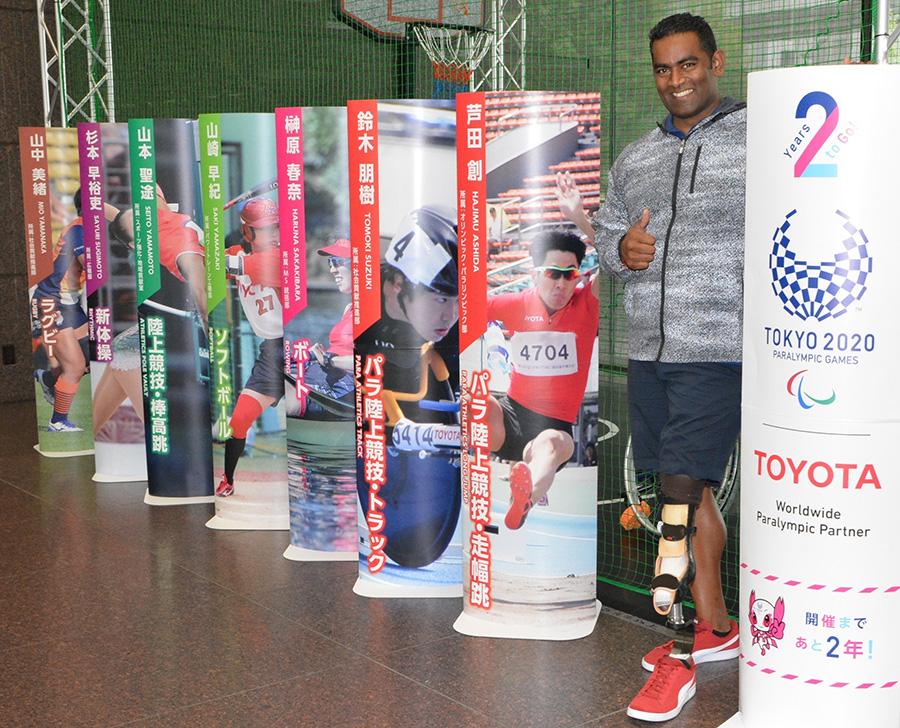
After achieving his own impossible and becoming a bronze medalist for South Africa, Tyrone would like to share his striving spirit and his success in overcoming challenges with everyone, especially to motivate kids with impairments. He hopes to share encouraging messages to people with impairments to encourage them to embrace their condition, and start their impossible.
“To Start Your Impossible, the most important thing is to always believe in yourself. When you believe in yourself, you can achieve anything,” concludes Tyrone. “You have to start somewhere, [so] start with a belief in yourself.”

